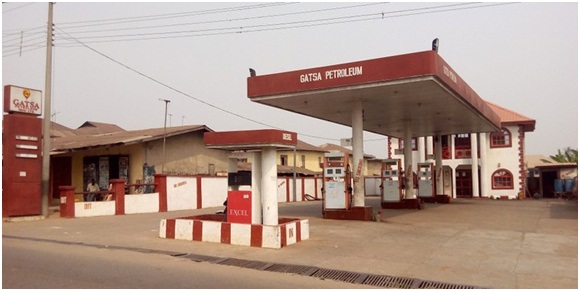Akure Shasha market traders and its stinking river
By Maria Famakinwa
|
Shasha, is one of the popular markets in Akure, the Ondo State capital, located along Owo-Akure Express Way. The market has been in existence for almost two decades.
The Hausa community majorly operates the market with a spattering population of traders of Yoruba extraction.
Different foodstuffs ranging from pepper, tomatoes, yams and onions, to plantain, vegetables fruits among others are sold in bulk. Being the terminus of foodstuffs brought in from the northern part of the country, the availability of food stuffs in cheap and wholesale volume has made this market the most preferred in Akure.
Despite all these good points, this popular market could be a channel for infectious diseases that might cause epidemic outbreak if urgent steps are not taken to address the dirty state of the market.
When The Hope visited Shasha Market, it was discovered that sellers of vegetables and fruits are in the habit of washing them in a river within the market very early in the morning, before taking them to sell to unsuspecting consumers.
A carrot seller was sighted washing his carrots in the dirty river.
The problem with the river is that it stinks to high heavens as people defecate and dump all sorts of dirt in it. As you approach the river, you will immediately perceive the strong stench oozing from it.
Sanitation and hygiene are cost-effective approaches against infectious diseases. The relatively inexpensive way of preventing infectious diseases seems to be neglected at Shasha Market .
Unfortunately, this is an example of what obtains at other markets across the country.
Shasha Market is an example of the poor sanitation in Nigeria’s markets which should be a matter of greater concern to buyers, sellers and policymakers.
Some residents in the area and consumers who spoke with The Hope described the act as hazardous to the health and called on authorities concerned to take drastic steps against traders found in the river.
A resident of the area, Haruna, who revealed that people defecate in the river condemned in strong terms the practice of traders washing their goods in the same river and selling to innocent buyers.
He revealed that the dastardly act has caused him to desist from buying fruits in the market, although he also sells in the market.
He said: “Traders have been warned severally not to wash vegetables and fruits in the dirty river but they would not listen. As you can see for yourself, the river is smelling because people defecate and wash clothes in it. Yet, some traders still come to wash consumables there. It is not good for one’s health. It might be a recipe for epidemic outbreak if nothing is done to stop those in the habit of washing consumables in the stinking river.”
Another resident of the area, Mr Ope Olatunji, described those washing vegetables and fruits in the dirty river as wicked saying they must know the harzard that the dirty river can cause.
He added that he feared for consumers who buy these fruits and vegetables without knowing what it had passed through. The man who observed that majority of residents come to buy fruits and vegetables in the market because they provide healthy nutrients needed for the body to function properly, however advised that such items should be washed thoroughly before eating to guard against any health challenge.
He said: “To say that the idea of washing consumables in the river where people defecate is condemnable is an understatement. There is a need for those indulging in the act to be arrested. The obnoxious stench oozing out from the river is better imagined than experienced.
“Yet, Shasha is one of the popular markets in the state capital. Something must be done urgently to save the lives of innocent consumers who buy things in the market. We have talked to traders against going to the river to do anything but some still go there.
“Some of the traders go to the river very early in the morning to wash consumables there after which they sell them to consumers. Government need to address this because other sellers at different markets comes to Shasha to buy vegetables and fruits. It can cause outbreak of epidemic.
“The situation is simply pathetic because some buy fruits and start eating without washing. Washing vegetables and fruits in such a filthy river where people bathe, wash clothes and defecate exposes consumers to avoidable diseases hence dire health concerns. Personally, I get very skeptical about where to buy fruits from for fear of paying for contaminated fruits, which could lead to food poisoning. The market environment is also very dirty and unhygienic. We are appealing to the state government to take steps that will prohibit anybody from going to the river side for residents’ safety,” he said.
A woman who buy things at Shasha Market, Mrs Justina Friday, who lamented the dirty state of the market said that the stench oozing out of the river was enough for traders to keep enough distance not to talk of going there to wash fruits and vegetables.
The woman who want the market shut down said: “ It is only if Shasha Market is shut down for a while that traders will desist from such a dangerous habit. Honestly, I find it hard to believe that anyone with the right state of mind can wash fruits and vegetables in such a filthy river. Another thing is that meat sellers are also selling beside the river despite the offensive odour. All these need to be looked into for consumers safety.
“A market is where fresh foods and vegetables are sold, you cannot have all these side by side with cabbages. An epidemic is far worse than not selling your fruits for a couple of days. Some of us cannot do without coming Shasha market but if the situation remain unchanged, someone like me with have no choice but to shop elsewhere,” she said.
Also, a woman who came for shopping at the market, Mrs Idiat Adeagbo, lamented why traders could chose to endanger the lives of unsuspecting consumers by washing what people will eat in the river where they defecate. The woman called on the State government to take drastic steps against those washing vegetables and fruits in the dirty river to serve as deterrent.
She said: “ There were areas within the market where open urination is practiced regularly, and flies and other vectors of infectious diseases were seen perching and feasting on uncovered food items for sale. This is the sad reality of most Nigerian markets, and it contributes to the spread of infectious diseases and environmental degradation because poor sanitation provides an excellent breeding ground for many of the diseases that affect residents.
“To be sincere with you, people in charge of the market have warned traders to desist from washing anything in the river when it was discovered that some people were defecating in the it. I heard that some people were positioned in strategic locations around the river to arrest any anybody sighted in the river, but some traders still go to the river to wash their goods very early in the morning to evade arrest,” she said.
One of the Hausa leaders at the market, who did not want his name in print explained that people have been warned against going into the river including those selling vegetables and fruits but they would not listen.
The man who added that consuming vegetables or fruits wash in the river could cause serious health challenge said, “We have been warning traders against doing anything in the river because it is very dirty and unhygienic but some will still not listen. I wonder why they are going to the river when we have clean water around the market. We are going to take serious action against anyone caught in the river,” He said.










